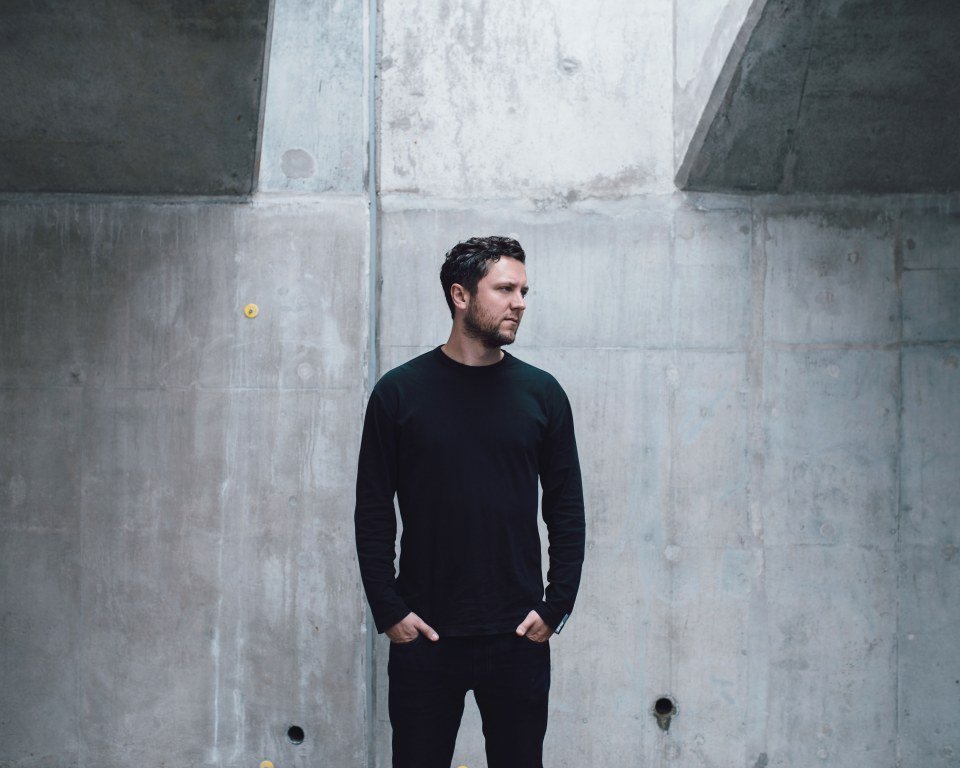What would melancholic electronic maestro George FitzGerald play at his funeral?

PHOTOGRAPHY BY RHODRI DAVIES, COURTESY OF DOMINO RECORDS.
A melancholic edge, beckoning moodiness and heady depths typify George FitzGerald’s electronic music. Composing twinkling, thought-provoking arrangements, FitzGerald has been booth deep in the club for the past eight years. His music is severely underrated.
Following on from his debut LP, Fading Love, released three years ago, FitzGerald returns with a masterful album, All That Must Be. It’s an autobiographical compendium reflecting on his love for his two daughters, consolidating tragedies of his past and anticipating the triumphs of his future. Naming a standout track after two-year-old daughter Frieda—who also features on an interlude—the album is hardwired to catapult FitzGerald out of suburbia and back onto club dance floors.
Ending a 10-year residency in Berlin to move back to his hometown of London, FitzGerald has also relocated to more mainstream record label Domino. Featuring vocalists Lil Silva and Tracey Thorn (Everything But The Girl) on the LP, a broader sound and braver sense of self resonates with this material. All That Must Be represents a sound which uniquely represents one of the greatest electronic artists of this generation. Where some of George’s contemporaries have lost their integrity and only aspired to satisfy trends in new music or achieve peak club slots, George has grafted to solidify an aesthetic which is rich in meaningful references and talent.
The music which he cherishes most intimately is the kind that he can listen to in quiet moments, traveling alone or waiting for his next live slot camped out in hotel rooms. The quietest moment of all is in death—so how would the electronic maestro soundtrack his own funeral?
“Love Bird,” Susumu Yokota
GEORGE FITZGERALD: “Love Bird” is just beautiful. One of Susumu Yokota’s albums was given to me by my brother as a late teenager and it was really my gateway into music that was slightly off the beaten track. This kind of music was not something l could read about in NME or find down at the record shop. Susumu very sadly died a couple of years ago and after him dying, his music just felt even more reflective and melancholic. I’ve always thought that this is a track that l would love to have played in memory of me, it has this positivity to it but also a melancholy. A lot of his music is incredibly beautiful.
I would want people to be moved at my funeral and that’s exactly how I feel when I hear this track. This is one of the most moving tracks I’ve ever heard. There was definitely real sadness in the electronic community when he passed away. I listened to his music in isolation for years. I had a very personal relationship with the music. I hadn’t realized that there were so many other people who were into his music until he died. I’ve always loved this track—it’s one of my desert island tracks.
“Immolate Yourself,” Telefon Tel Aviv
FITZGERALD: This is another slightly morbid one, quite sadly. Shortly after Teflon Tel Aviv released this, one of the duo Charles Cooper disappeared and was found dead a few days later. I don’t know whether I’m reading too much into the idea of immolating yourself and the destruction of the body but that’s what I get from the track.
I think this is an incredible piece of music. I can hear someone thinking about death in there. I’m not sure if that’s accurate or not, but it makes me think of the destruction of the body. There are religious feelings in the sound towards the end, euphoria. This track contains the qualities of sound that I look for in my own music, simultaneously sad and euphoric. In that sense, the music almost feels religious, especially in the context of this guy sadly dying very soon after they released “Immolate Yourself.” There are such heady connotations here, I can’t take that context away from this after listening to it.
This track has an incredible video (above) which is worth checking out. It’s the first thing I remember about this track, a guy in a business suit who is running along and then gets diced up and atomized. The music got a lot of attention at the time, especially as the guy sadly passed away. I just came to it like everyone else did. I bought the album. There is another track on that LP called “Birth.” I loved the album and so booked a ticket to go see them and then learnt Charles had died and so the music stuck with me maybe a little bit more than other stuff from that time.
“Electric Counterpoint Fast (movement 1),” Steve Reich
FITZGERALD: This is probably the least personal addition on here. I think it’s simply one of the most beautiful electronic arrangements I have ever heard. I would describe this as proto-electronic music that is minimalist. This would be my mood piece for people to reflect on what a wonderful person I was. [laughs] This music allows for a moment of reflection: when I am traveling or feeling down, or contemplating life, this is a record I put on. It’s quite meditative. I don’t actually do meditation but if I did, I would meditate to this. Electric Counterpoint has never made it into one of my mixes; this one is more mainstream, it’s quite a famous track so that’s why I have ducked away from placing it in mixes. I think maybe people would expect me to dig deeper.
I associate this track with being up in the sky, those moments on tour, when you are on your own and your life is going on somewhere else, on earth and you are up in the sky and then you put on something like this. You can be prone to being a bit weepy at altitude. Traveling is a nice time to reflect. You have time to yourself, alone with your thoughts, so much more so than if you were touring with a band. I have had a lot more time alone than many other artists, so I have the luxury to think about things and to overthink things. This track is a mood accompanier, a track to travel to. I would love to work on a conceptual album one day like Brian Eno’s [Ambient 1: Music for Airports], something a bit far out and based on one conceptual idea.
The Smashing Pumpkins
FITZGERALD: I think if there is one other artist or band I would cite as being the most influential or meaningful to me and my brother it would be Billy Corgan and The Smashing Pumpkins. I had a hard time picking one of their tracks. I could have gone for the more obvious ones like “1979.” I love “Mellon Collie and the Infinite Sadness.” “Thirty Three” is one of their slightly less obvious releases but still my favorite track of theirs.
Billy Corgan has always been divisive with his music, some people think his voice is a bit whiney. I never did. I feel that their music is truly unique, I’ve always thought they were an incredible band. I wonder if people think I am quite like them with my ’90s aesthetic at times. My music feels like an autobiographical project, when I think about how much time I spent listening to The Smashing Pumpkins and still do, I can acknowledge how much of a big part of my sound they are.
At the age this came out I was shitty and spotty, briefly into garage. At that age, you listen to a lot of music and a lot of it doesn’t stick. A lot of people look back at what they were into as a teenager and cringe, so do I but not with The Smashing Pumpkins. They have been a constant in my musical life. There’s an element of nostalgia to their sound, I don’t think their music has dated. Old drum and bass or hip hop tracks from the ’90s can take you right back to that time and place where you were, there and then. I still feel present when l hear “Thirty Three.” Some of the grungy tracks may age slightly perhaps but not this one, but “Thirty Three” feels timeless.
“Desire,” 69 (Carl Craig)
FITZGERALD: Again, going through my electronic musical heroes, Carl Craig was a top of the tree influencer, under whatever guise he was going under at that time, either CT, remixes or off kilter albums like 69. Carl Craig manages to find chords that no one else can or does. He comes from a jazz background like many of his contemporaries from Detroit. There’s something about the chords in his music that move me, the drums feel so sad; it’s another up in the air crying your eyes out number. Electronic music doesn’t really get any better than that. It manages to feel so deeply moving.
“Motion Picture Soundtrack,” Radiohead
FITZGERALD: Maybe with this track people would think I was being very self-indulgent. By this point people would be either completely losing it, or they would be fed up of how heavy the proceedings were and would be wanting to tell a joke. I relate this track to a particular relationship I was in. It is so heavily associated with one person that I can’t listen to it anymore. Kid A is in my top five albums of all time for production and now I just can’t listen to the last track. I play through the whole album and I just can’t make it to “Motion Picture Soundtrack.” It’s too bound up with my experiences at a certain time. Music takes on new meanings with different people as you go through life—this took on profound meaning for me. The words, “Maybe you think I’m crazy / maybe you think I’m crazy,” it sounds like someone talking to a lover. That’s the cinematic element of being in love. It’s very sad at the same time, it’s all captured very beautifully.
“Beginning At The End,” George FitzGerald
FITZGERALD: This is my favorite track of mine. It’s poignant for me as it relates to certain points in my life when a lot of things were very difficult. This was about starting again, hence beginnings after endings. It was a hard track to write but it came out quite quickly.
This is my electronic mood piece. Given when I die, I will have dedicated most of my life to my music, it is right to feature one of my own tracks at my funeral. Maybe other people would disagree with me that this my best track, which they are entitled to, but there is something about “Beginning At The End” which captures a moment of my life better than I have ever done before. I listen to it and hear the feelings I experienced that day. It’s quite rare to capture and crystallize something as accurately as that when you are writing. Often, with my tracks, I listen back to them and think I’m a bit bored of that or maybe I could have done that better—but not this.
“Fire And Rain,” James Taylor
FITZGERALD: Because it’s the one moment of levity that people are allowed. I spent my whole childhood being driven around by my parents with a James Taylor tape on repeat, like so many people did. There’s something about James Taylor’s lyrics. I was listening back to his music when I was trying to pick a track for you and I just felt like I needed a James Taylor track in there. A lot of his lyrics were about a life well lived, reflecting on people coming in and out of your world. The themes of his music are inherently grande. “Fire and Rain” is about time passing. It’s not about a lover, it’s about something in his life passing on and I just thought that was a nice way to end this; a positive but reflective track about the passage of time and living your life well.
This is probably my most listened to track.
ALL THAT MUST BE (DOMINO RECORDS) IS AVAILABLE MARCH 9, 2018.






